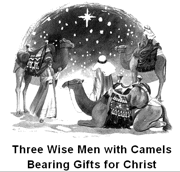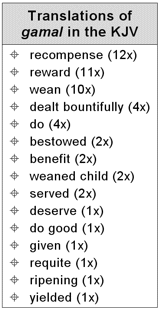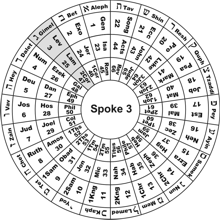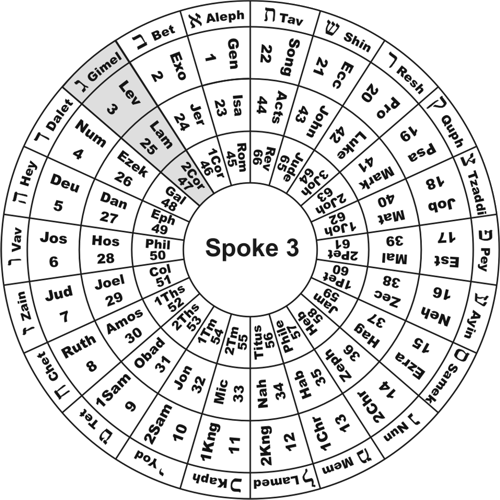The Holy Spirit: Giver of God's Abundant Gifts
But this I say, He which soweth sparingly shall reap also sparingly; and he which soweth bountifully
shall reap also bountifully. Every man according as he purposeth in his heart, so let him give; not grudgingly,
or of necessity: for God loveth a cheerful giver. And God is able to make all grace abound toward you; that ye,
always having all sufficiency in all things, may abound to every good work: (As it is written, He hath dispersed
abroad; he hath given to the poor: his righteousness remaineth for ever.
2 Corinthians 9:6ff (Spoke 3, Cycle 3)

The name of the Third Letter is based on gamal, the common Hebrew word for a camel. Its shape in
the ancient Hebrew script -  - represented the camel's head and neck and gave rise
to the corresponding Greek Gamma, Γ. This word is almost identical to the English
camel where we find the Third Latin Letter c exchanged for the third Hebrew letter ג (g).
This is a common interchange seen also in the relation between the English words cycle and circle with the corresponding
Hebrew גלגל (galgal) which denotes a circle, cycle, or wheel (see
pg 377 of the Bible Wheel book). - represented the camel's head and neck and gave rise
to the corresponding Greek Gamma, Γ. This word is almost identical to the English
camel where we find the Third Latin Letter c exchanged for the third Hebrew letter ג (g).
This is a common interchange seen also in the relation between the English words cycle and circle with the corresponding
Hebrew גלגל (galgal) which denotes a circle, cycle, or wheel (see
pg 377 of the Bible Wheel book).

Though the traditional Christian image
of three magi with camels bearing gifts for Christ is not stated as such in Scripture, it is in complete harmony with the
meaning of camels in the Bible where they are frequently used as a symbol of wealth and abundance.
The first three appearances of this animal are coordinated with the descriptions of the wealth of the first three patriarchs,
Abraham (Gen 12:16), Isaac (Gen 24:10), and Jacob (Gen 30:43). This links directly to the great themes of the Third
Spoke which are centered on the ideas of giving and reward in all their various senses,
including charity to the poor, nourishing motherly love, offerings unto the Lord, and the Lord's reward for our deeds, whether good or bad
(see The Riches of their Liberality, BW book pg 163). God revealed this meaning in the first Gimel verse of the great
Alphabetic Psalm 119:
- AV Psalm 119:17 Deal bountifully (gamal) with thy servant, that I may live, and keep thy word.

Except for vowel points, this KeyWord is identical to the name of the Third Letter.
We have here a powerful Alphabetic Link from the first Gimel verse of Psalm 119 to the Book of 2 Corinthians which contains
the one and only New Testament verse that uses the word "bountifully" (quoted above). This is pretty much independent
of translation; the same link is seen in most major English versions, such as the KJV, ASV, NASB, RSV, NRSV, and ESV.
It is part of the great theme of abundance and giving to the poor that distinctly marks
2 Corinthians (see BW book, pg 163).
It is a unique link from the Alphabetic Verses to the Third Book of the Third Cycle, but it is not a KeyLink in the strict sense
(as a link unique in the whole Bible) because "bountifully" appears in a few Psalms that are not alphabetically structured.
But in all six Bible versions cited above, every occurrence of "bountifully" in the Old Testament is a translation of
gamal, so we have a very strong thematic link that exemplifies one of the primary symbolic meanings of Gimel and shows how
God used this meaning in the supernatural design of His Word. This KeyWord appears again in one other Alphabetic Verse:

- AV Proverbs 31:12 She will do (gamal) him good and
not evil all the days of her life.
The table shows how the KJV translates the 56 occurrences of this root (Strong's numbers 1576 and 1580).
Its various meanings exemplify primary aspects of the Work, Character, and Ministry of the Holy Spirit,
the Third Person of the
Trinity, as well as many dominant themes of Spoke 3. The camel itself is an excellent metaphor of the Holy Spirit who
carries the children of God through the dry dessert of this world. He sustains us,
nourishes us, and gives us
all we need in our earthly pilgrimage. He weans and ripens the children of God as we grow into spiritual adulthood.
Desert dwelling Bedouins call the camel the Gift of God because their entire sustenance - food, drink, clothing, fuel,
and travel - depends upon it. All of this links directly the Divine Character of the Holy Spirit, who is both
the Abundant Giver of God's Gifts and the greatest Gift of All - the indwelling
presence of the Creator in the heart of every believer.
|



